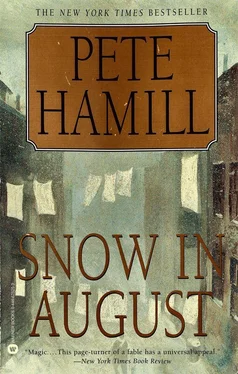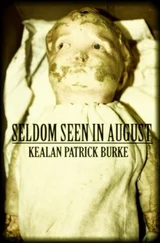The United States, where religious and political freedom have attracted Jews from all lands where they have been oppressed, has the greatest number of Jews , the blue book said. In the forty-eight states and possessions there are 4,229,000, of whom nearly 2,000,000 live in New York City .
Michael suddenly realized that he knew almost no Jews. There was Mister G, of course, and Mr. Kerniss, the landlord, who was about seventy years old and came around every month to collect the rents from the super. Now there was this rabbi on Kelly Street, but he didn’t really know him. He’d met him, but he didn’t know him. He didn’t even know his name. Almost everybody else in the parish was Irish, Italian, or Polish, or as some of them said, Micks, Wops, and Polacks. They were Americans, of course. But they described themselves on the basis of where their parents or grandparents came from. Michael was Irish. Like his mother, who came from Belfast in Northern Ireland. Or his father, who came from Dublin. And Sonny Montemarano was Italian. And Jimmy Kabinsky was a Polack. No matter where their people came from, almost all of them were Catholic. There were a few Protestants around too; they went to the public school and the Protestant church on White Street and played in the street like the others. But they were just plain Americans; their parents never talked about the Old Country; they acted as if they had been in Brooklyn since Indians roamed in Prospect Park.
But there were no Jewish kids at all. Even Mister G’s three kids were like phantoms. They didn’t hang out in the parish. They didn’t play on the streets in summer. They were just blurry faces in the back of the candy store. Michael had never seen any young people going in or out of the synagogue on Kelly Street. Not one. On Saturday mornings, there were only a few old men and women on the sidewalk. How could that be? If there were two million Jews in New York City, where did they live? Where were their kids? Did they play stickball? Were they Dodger fans? Did they pitch pennies in the summer and trade comics and read about Captain Marvel? Why weren’t more of them around here ?
He wanted to wake up his mother and ask her all these questions. He wanted to tell her about his discoveries about the Jewish laws and the health codes and the alphabet. He wanted to ask her why all those Jews had been killed by Hitler if even before the war everybody knew what he was up to. He wanted to ask her if she’d ever heard Jewish music and where those two million Jews lived in the city of New York.
But she looked exhausted, tired from the long hike through the snow to the hospital and the harder walk back, when the snow was deeper. Her jaw hung slack, her mouth open. He touched her forearm. Her eyes opened.
“Mom,” he said, “you better go to bed.”
She looked startled. “What time is it?”
“It’s late,” he said. “Go to bed.”
In his own room, with the door closed, his teeth brushed, warm under the covers, Michael lay awake. The walls glowed brightly from the freshly falling snow. There was no wind and no sounds as the snow fell all over the parish. In the back room of the candy store, while the snow piled up on the sidewalk, Mister G’s wife was probably weeping. Her husband had been taken away in an ambulance, unconscious, his face a swollen, bloody mess. Everybody saw the ambulance and the police cars and nobody said anything. At the synagogue on Kelly Street, the snow was gathering on the doors and the front steps and the roof, while the bearded man with the sad eyes listened, Michael was sure, to Jewish music, beautiful and tender.
The rabbi was from over there. Somewhere in Europe. Michael knew that from the accent. He wasn’t from here. But how did he escape? The newspapers said that maybe six million Jews were killed. Why wasn’t he one of them? Was he from Poland too? Did the Nazis come to his door? Did he hide in an attic or a closet? Did he pick up a gun and fight? The rabbi had to have a story, and Michael wondered what it was.
Just before sleep came, he thought about what it would be like to meet Judith, with her bracelets and earrings and jeweled hair, and touch her golden skin. Then he pushed her from his mind too, as an occasion of sin, whispering the words of the Hail Mary to keep himself pure as a snowy hill in Prospect Park.
In the morning, after mass, Sonny and Jimmy rang the bell and Michael bounded downstairs to meet them. Sonny embraced him in the hallway.
“We didn’t leave you flat, Michael,” Sonny said. “That fuck Frankie McCarthy was all over the place with his boys, the fuckin’ Falcons, so we had to hide out.”
“We stayed up the house,” Jimmy said. “Listenin’ to the radio.”
“That’s what I figured,” Michael said, wanting anxiously to believe that he had not been abandoned in Mister G’s store. He didn’t tell them how he’d felt, and didn’t mention to them that he had called the ambulance. That was yesterday; today was today. They started to walk toward the park. The air felt cold and clean. Michael thought that the snowbanks were like mountain ridges now, and they began to name the tall piles on the corners, shoved into peaks by the city snowplows. Mount Collins. Mount MacArthur.
“Fuckin’ mountains will last ’til summer,” Sonny said. They laughed, and watched smaller kids burrowing like miners into the sides of the snow hills. It was hard for Michael to imagine these streets sticky with summer.
They walked into the park, following the kids lugging sleds and others draped with ice skates. At a food stand beside the zoo, Sonny bought a hot chocolate and shared it with Jimmy and Michael. The only animals in sight were the polar bears, and Michael thought they looked happier than he’d ever seen them.
“How do you figure Mister G is feelin’?” Sonny said at last.
“How could he feel?” Michael asked. “Frankie hit him with the goddamned cash register.”
Sonny shook his head and looked off at the snowy forest beyond the zoo. “I know how I feel,” he said. “I feel fuckin’ awful. The guy was stickin’ up f’ me remember?”
Michael remembered.
“It’s over,” he said.
“Like hell it is,” Sonny said.
For the next two days, Mister G’s candy store remained closed. At all hours, Michael and his friends saw detectives moving around the snow-packed streets of the parish in an unmarked police car. These were the cops they called Abbott and Costello, because one was tall and thin and the other short and fat, like the movie comedians. They were not comedians. Most of the kids had heard what they did to bad guys in the third-floor squad room at the precinct house on McGuire Avenue and didn’t want such things to happen to them.
Around noon on the second day, Abbott and Costello stopped in front of Unbeatable Joe’s and went in together and drank beer at the bar for a while and then left. Costello did the driving. Then they pulled up in front of the Star Pool Room, across the street from the Venus, and hurried in. They came out talking to each other, shaking their heads. Costello waddled into the Venus, while Abbott waited outside in the snow, his right hand inside his gray overcoat. Michael saw him spit into a snowbank. Then Costello came out of the Venus and they got in the car and drove away.
“They’re lookin’ for Frankie,” said Sonny. “For beating the shit outta Mister G.”
The boys were standing in the doorway of the variety store next to Slowacki’s candy store, stamping their feet to keep warm.
“I saw them go up his house too,” Jimmy said.
“I hope they get him,” Michael said. “I hope they put him in the goddamned can.”
“What?” Sonny said. “You hope they get him?”
Читать дальше












